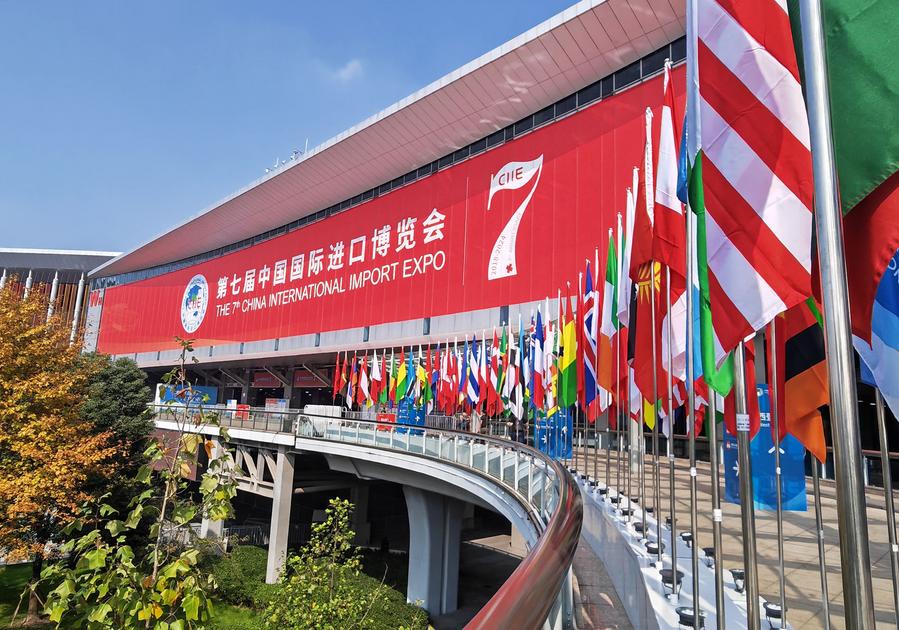
 0 Comment(s)
0 Comment(s) Print
Print E-mail Xinhua, April 7, 2025
E-mail Xinhua, April 7, 2025

This photo shows the National Exhibition and Convention Center (Shanghai), the main venue for the 7th China International Import Expo (CIIE), in east China's Shanghai, Nov. 4, 2024. [Photo/Xinhua]
Against a global economic backdrop of rising protectionism and fragmentation, will the world's second-largest economy still be dedicated to opening up and championing economic globalization?
The message China has made is loud and clear: instead of retreating into a closed economy amid external uncertainties, the country will walk its talk in becoming more and more open.
This message is backed up by both the country's track record and action plans, which have set a positive example in building bridges rather than walls in a world where only cooperation could bring prosperity.
Growing openness and appeal
China has been translating its opening-up pledge into concrete actions, with fruitful outcomes evidenced by the super-large market's robust appeal to foreign investors.
Regarding expanding foreign investors' access to the Chinese economy, the country has slashed related items on its national negative list from 190 to 29 in recent years, with even greater market openness in the country's pilot free trade zones.
In a landmark opening up gesture, all restrictions on foreign investment in the manufacturing sector were removed in China last year, while some developed countries still set barriers against foreign investment in certain manufacturing industries.
On trade, China's overall tariff level has been cut to 7.3 percent, a fairly low level nearing the average of developed countries. China has also extended zero-tariff treatment to all 43 least-developed countries it has diplomatic ties with, the first developing country and major global economy to implement such a unilateral opening up initiative.
According to the World Openness Report 2024, which tracks 129 economies, the openness index for developed economies declined by 7.7 percent from 2008 to 2023, while emerging markets and developing economies saw an increase of 5 percent. Notably, China's openness index rose by 11.89 percent, ranking among the fastest-growing globally.
Growing economic openness has further cemented China's position as the world's second-largest foreign direct investment destination. Hosting 1.24 million foreign firms across 20 industries and 115 sub-sectors, China has attracted nearly 3 trillion U.S. dollars in cumulative investment during the period.
Christian Hartel, president and CEO of German chemical giant Wacker Chemie AG, said the company has "benefited greatly from China's reforms and openness." The country, its largest single market, accounts for nearly a third of group sales and has drawn 1 billion euros in investments.
A critical role
Since the 1970s, China's basic state policy of opening up has been instrumental in its meteoric economic rise, and it's believed to remain a major catalyst for the country's push to deepen reforms and sustain economic growth in the journey ahead.
By embracing global trade and investment, China has drawn countless foreign firms to its vast market. Currently, foreign enterprises account for one third of China's total trade value, one quarter of its industrial value added, and one-seventh of its tax revenue, while creating more than 30 million jobs.
The process of opening up has also spurred advancements in technology and management in China. Over the past decade, research and development spending by foreign-invested industrial firms in the country has increased by 86.4 percent, and the number of effective invention patents has more than tripled.
John Ross, a senior fellow at the Chongyang Institute for Financial Studies at Renmin University of China, noted that China's growth -- alongside that of the Global South -- stands in stark contrast to the slowdown in inward-looking Western economies, which indicates openness pays.
"Given the situation at home and abroad, global economic exchanges will remain critically important for China's economy and are expected to grow in significance in the future," said Huang Yiping, dean of the National School of Development at Peking University. Academic research, he noted, underscores how openness enhances a nation's innovative capacity.
In its grand reform and development agenda unveiled last year, China has positioned opening up as "a defining feature of Chinese modernization," and vowed to continue to promote reform through opening up, enhance related capacity while expanding international cooperation.
"No matter how the international environment changes, China, as the world's second-largest economy and the second-largest consumer market, will continue to open its doors wider," the Ministry of Foreign Affairs said Saturday in a statement.
Toward a higher-standard open economy
Opening up, however, is an ongoing -- and not risk-free -- process, especially for a developing country like China. As China strives to build a higher-standard open economy, it has pursued progress with both ambition and caution.
The country has made institutional opening up a priority, vowing to align with high-standard international economic and trade rules, covering areas ranging from property rights protection and industrial subsidies to government procurement.
Meanwhile, despite deficits in service trade, China seeks to further open sectors like telecommunications, the internet, education, culture and medical services in a well-conceived way.
In China, pilot opening up programs in free trade zones and select cities usually precede nationwide roll-out. For instance, wholly foreign-owned hospitals are now allowed in certain cities and regions, while foreign financial institutions are permitted to conduct the same new financial services as domestic players in eligible free trade zones.
"China is now braving uncharted waters in its reform and opening up push," noted Cui Weijie, deputy director of the Chinese Academy of International Trade and Economic Cooperation, a think tank with the Ministry of Commerce. "The next phase of high-standard opening up mainly involves sensitive sectors."
"Such a situation calls for rigorous risk identification and assessments, and effective guardrails to ensure the bottom line of security," Cui added.